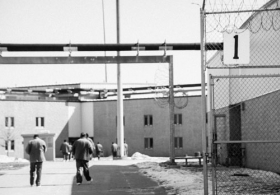By Natalie Moore

Illinois’ Danville Correctional Facility. CHA is launching a pilot program to let formerly incarcerated individuals live with their families in CHA housing.
The family reunification program will allow 50 formerly incarcerated individuals to move back into CHA housing over the next three years. Normally, CHA prohibits anyone with a criminal background to live with relatives. This new program will also include residency in the subsidized housing voucher program, known as Section 8.
Once people leave prison they often have nowhere to go and return to neighborhoods with high crime and poverty.
Recently, WBEZ analyzed 2012 data from the Illinois Department of Corrections, and found that thousands of adults return to just a handful of Chicago zip codes after they get out of prison. For example, four West Side zip codes – 60651, 60644, 60624 and 60612 – had more than 2,400 parolees return in that one year alone. Many of these neighborhoods already have high rates of violence, unemployment and poverty. The large number of parolees living there becomes a collective burden increasingly hard to bear.
CHA CEO Michael Merchant said the family reunification program is important because it can “support these ex-offenders coming out making sure they have stable environments. I think it’s a win-win for everybody. The main thing is we want to make sure the ex-offenders don’t become re-offenders out in our neighborhoods.”
Those selected must be on a path toward self-sufficiency and rehabilitation. The Safer Foundation, Lutheran Family Services and St. Leonard’s House are the service providers that will recommend the 50 people.
“This is a big step for the city of Chicago to partner with people with criminal records…it will help them reintegrate into the communities,” said Anthony Lowery, the policy and advocacy director at the Safer Foundation.
Sex offenders and people convicted of arson, production of methamphetamine in public housing and fraud with federal housing will not be allowed in the program. They are banned by federal policy.
The CHA board and the U.S. Department of Housing and Urban Development must first approve the pilot program.
